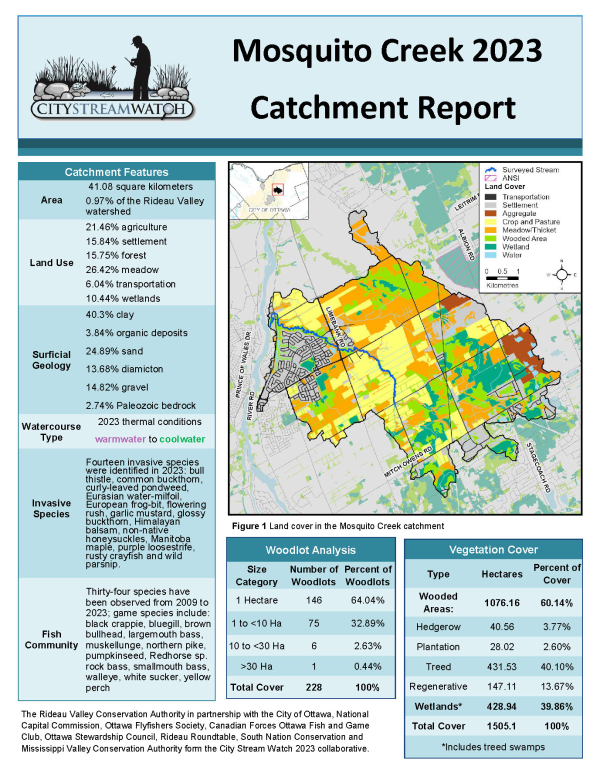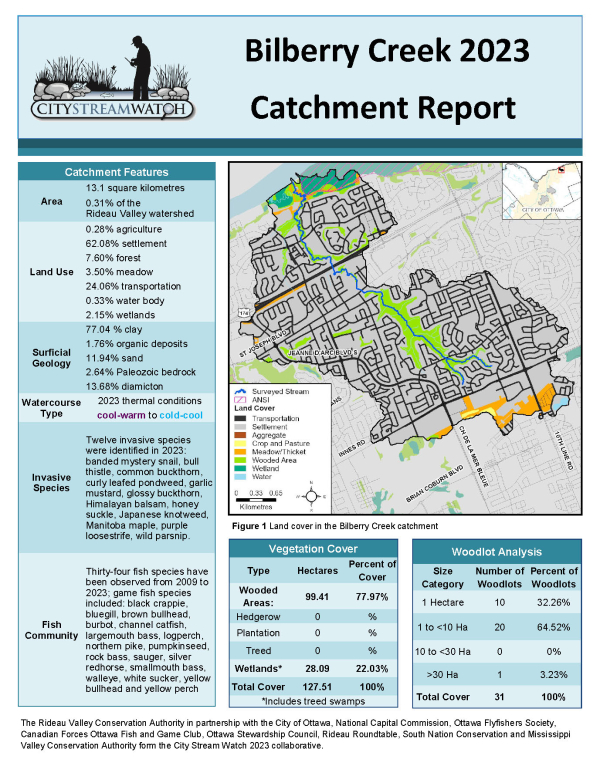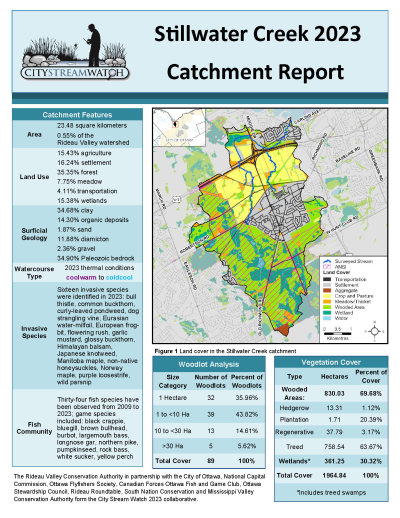
RVCA (1141)
Children categories

Department (66)
Main Office Phone Numbers : 613-692-3571 / 1-800-267-3504
Staff Directory
City Stream Watch 2023 Stillwater Creek Catchment
Download attachments:
RVCA Interim Policy for the Administration and Implementation of Ontario Regulation 41/24
Download attachments:
For most properties, we require a minimum of 0.5 hectares (1.25 acres) in total area to be planted. For reference, 1 acre is approximately the size of 2.5 hockey rinks.
Areas that are Suitable
Old fields |
Shrub land |
Residential lawns |
Windbreaks and Rows |
Areas that are Unsuitable
- Areas with existing tree cover
- Areas under hydro lines
- Very shallow soils or exposed bedrock
- Areas that flood or hold significant amounts of water in the spring

Published in
Stewardship
Water Conditions Statement: Water Safety — Lower Ottawa River March 18, 2024 — A Water Safety Statement is being issued for areas along the Lower Ottawa River (Arnprior to Hawkesbury). This winter has been characterised by unseasonably warm temperatures, below-average precipitation in many locations and several melt events. As of mid-March, the amount of water in the snowpack is well below average for this time of year across the Ottawa River watershed. The snow is essentially gone in the south-east portion of the basin and well below average elsewhere for this time of year. Environment Canada is forecasting cooler, more seasonable,…
Published in
Watershed Conditions Statements
(WCS – R04/2024)March 8, 2024 – The Rideau Valley Conservation Authority is issuing a WATER SAFETY message for the entire Rideau Valley Watershed. A low pressure system is expected to bring widespread rain to the region, with between 20mm and 40mm expected throughout Saturday and Sunday. Snow conditions in the Rideau Valley watershed are largely depleted, but flows and water levels remain elevated from recent melt and rainfall events. While significant flooding is not anticipated at this time, water levels and flows in all waterways are expected to increase and may exceed their banks along smaller tributaries and streams. Residents in these regions…
Published in
Watershed Conditions Statements
(WCS – R03/2024)February 26, 2024 – Unseasonably warm temperatures combined with significant rainfall is expected to trigger a widespread melt across the Rideau Valley Watershed this week. Temperatures are expected to rise significantly on Tuesday, February 27 and last until Thursday, February 29, with daily highs exceeding 10°C. Widespread precipitation is also expected during this period, with forecasts estimating between 20 and 30 mm of rainfall. Although snow conditions are considered below normal for this time of year, the warm temperatures and added rain will trigger an accelerated melt. Beginning on Tuesday, water levels and flows are expected to increase in all…
Published in
Watershed Conditions Statements
More...
(WCS – R02/2024) February 9, 2024 – Caution is advised as above normal temperatures are forecasted for the Rideau Valley Watershed this weekend. Environment Canada’s short-term weather forecast indicates above-zero temperatures approaching 10 degrees Celsius on Friday and Saturday. On Sunday and Monday, the temperatures are forecast to approach 5 degrees Celsius before cooling off to more seasonal below-zero temperatures next week. Less than 5 mm of precipitation is expected on Friday and Saturday. Water levels and flows are generally average for this time of year across the Rideau Valley Watershed. Although no significant flooding is anticipated, water levels and flows…
Published in
Watershed Conditions Statements
February 05, 2024
Groundbreaking report highlights environmental concerns, shifts across Rideau Watershed
RIDEAU VALLEY, February 5, 2024 – A new detailed analysis from the Rideau Valley Conservation Authority (RVCA) has found many parts of the Rideau River Watershed are changing fast – and not always with positive results. The RVCA’s 193-page Watershed Conditions Report is the first of its kind in more than 50 years. It compiles recent and historical monitoring data to assess trends regarding surface and ground water quality, aquatic ecosystem health, hydrological function, natural hazard risks and the status of critical green infrastructure such as wetlands, forests and natural shorelines. The analysis found several concerning trends including a continuing steep decline in…
Published in
Media Release




















